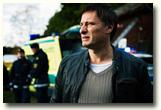|
Source: Amsterdam Interview [Translated and
edited]
Date: March 28, 2010

For Michael Nyqvist, it was a
challenge to take on the role of Mikael Blomkvist in the
film adaptations of Stieg Larsson's "Millennium" series.
He says, "Fifty million people had
already read my script."
Even if he's unshaven, Michael Nyqvist was recognized by
the baker this morning. He grumbles, laughingly, "You
can no longer get a sandwich. People stare at me and
point."
Nyqvist is spending a day in Amsterdam. Since last week,
the third and final part of the "Millennium Trilogy" has
been in the cinemas. He gladly supports this with
interviews, although he did face bigger challenges than
Millennium as an actor.
Michael: "I was really proud of 'As
It is in Heaven', because that film went from mouth to
mouth. 'Millennium' is, in all honesty, a bit like
'Harry Potter'. You read the book, you are going to see
the film. You fill in a thought-out character as an
actor. With 'As It Is In Heaven', we had to come up with
everything. And we came up with it together."
The film, by director Kay Pollak, was
nominated for an Oscar.
Michael: "The challenge here was to find a challenge.
Fifty million people had already read my script. Very
weird. I felt invisible. That sounds crazy for an actor.
I did not have to invent anything. I was not used to
that. Everyone knew Blomkvist, or thought they knew him
and everyone had ideas about what I should or should not
do. I did not care about what they said. I did it my
way."
With "Millennium" Nyqvist had to work
with two different directors. The initial plan was only
to film Stieg Larsson's first book for the cinema. A
television or DVD version of the other two books would
then be included. The Dane Niels Arden Oplev directed
the first film, Nyqvist's childhood friend DaniŽl
Alfredson the other two. They knew each other from
primary school, played in a rock band - Nyqvist sang and
played guitar.
Was he actually eager to play the
role of Blomkvist?
Michael: "I tried to stay outside the
buzz. Whoever was going to play Blomkvist, that was what
kept Sweden busy when it became clear how successful the
books were going to be. I did not want to interfere. I
feared it would be very commercial and I don't like
that."
A conversation with Niels Arden Oplev changed his mind.
Michael: "He really had serious
plans. He did not want to film Stieg Larsson's books,
but his universe. That did interest me."
Only then did he read the books.
Michael: "Everyone was reading
Larsson in those days. I thought I'll stick to my
Proust. Then, like everyone else, I was totally seized
by the books. I had devoured them within a week. Where
was number 4?"
As satisfied as he is about the series, he is so
skeptical about the plans for an American remake of
"Millennium". "They have to because the use of subtitles
in America does not work. But whatever the Americans do,
it is always commercial. If it has to be non-commercial,
someone like David Lynch has to do it. That is what I
heard. There are a lot of rumors anyway. The first rumor
was that Brad Pitt would play my role and Quentin
Tarantino would be in charge."
In "Millennium" Nyqvist forms a couple with Noomi Rapace,
the actress who impresses so much in her role as Lisbeth
Salander. In the second film, however, they only have
two scenes together.
Michael: "That was very sad. In the
first one film, we were so attached to each other. We
had built a good relationship. In the second film, we
did not know what we were doing."
In the third film, there are a number
of beautiful scenes in which a society of now-aged men
try to keep their role in the Secret Service really
secret. Wonderful acting from actors unknown in the
Netherlands.
Michael: "I am glad that it stands
out. We have a school, we have a tradition. The
tradition of Chekhov, Stanislavski. Brecht too, at the
end of the sixties. We are very good in Sweden. We have
very good actors. We do not show too much emotion. All a
little depressed in the eyes. A Swedish actor never
laughs. That is what we learn. In Italian or Spanish
films I see a lot of overacting. There they have tele-novellas
and other soaps. That encourages bad acting. We do not
have soaps. That does not work in Sweden. We do not know
that way of storytelling. This is more than compensated
by a huge selection of Swedish thrillers, in book form
and as television series. The focus is on murder
and manslaughter, yes. In Swedish thrillers, the
question is: why does that man have to kill if
necessary? We immediately connect the question of what
is so sick in society that the murderer comes to his
actions. That is really a typical Swedish approach."
 |